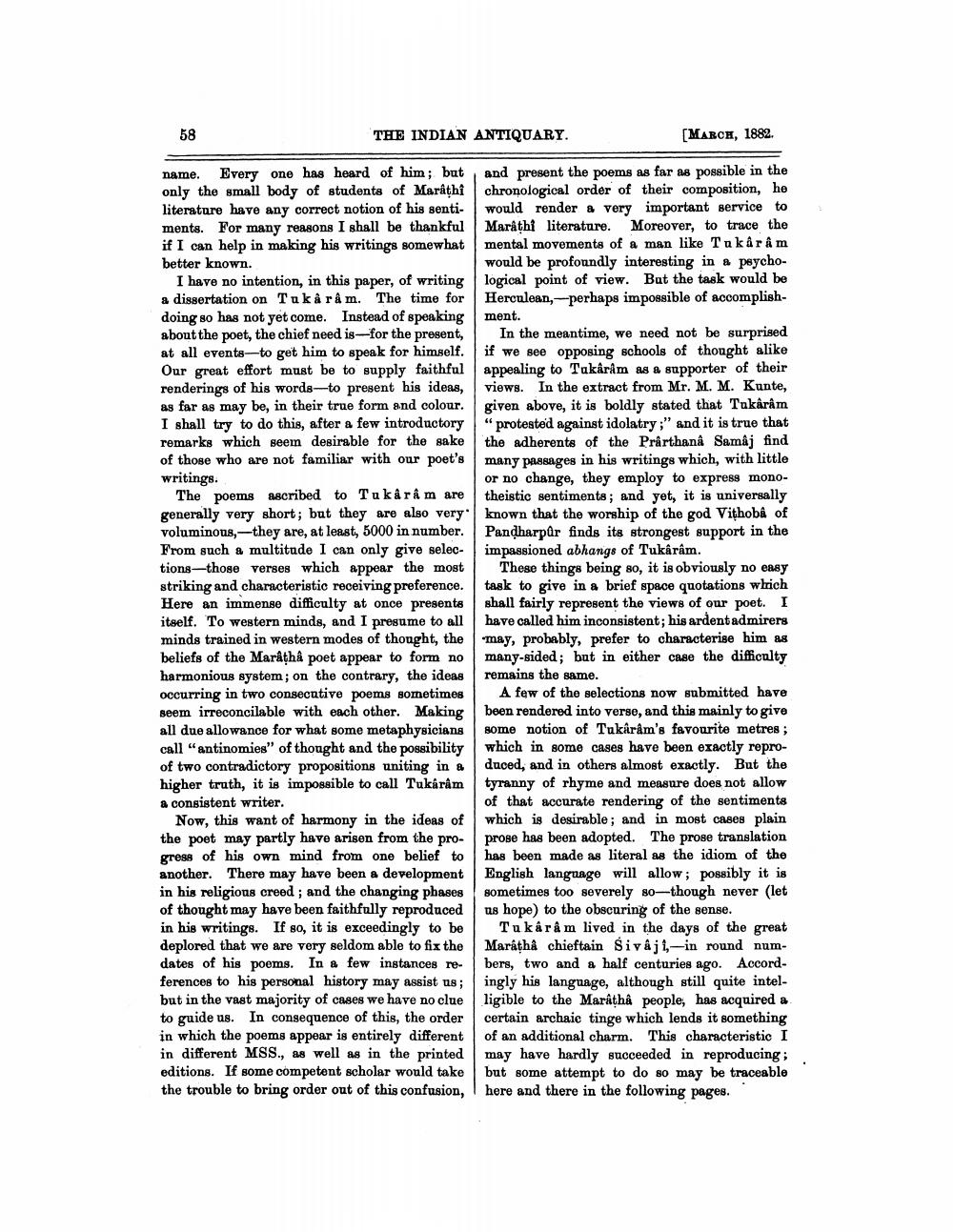________________
58
THE INDIAN ANTIQUARY.
name.
Every one has heard of him; but only the small body of students of Marathi literature have any correct notion of his sentiments. For many reasons I shall be thankful if I can help in making his writings somewhat better known.
I have no intention, in this paper, of writing a dissertation on Tukârâm. The time for doing so has not yet come. Instead of speaking about the poet, the chief need is-for the present, at all events-to get him to speak for himself. Our great effort must be to supply faithful renderings of his words-to present his ideas, as far as may be, in their true form and colour. I shall try to do this, after a few introductory remarks which seem desirable for the sake of those who are not familiar with our poet's writings.
The poems ascribed to Tukaram are generally very short; but they are also very voluminous, they are, at least, 5000 in number. From such a multitude I can only give selections those verses which appear the most striking and characteristic receiving preference. Here an immense difficulty at once presents itself. To western minds, and I presume to all minds trained in western modes of thought, the beliefs of the Marâțhâ poet appear to form no harmonious system; on the contrary, the ideas occurring in two consecutive poems sometimes seem irreconcilable with each other. Making all due allowance for what some metaphysicians call "antinomies" of thought and the possibility of two contradictory propositions uniting in a higher truth, it is impossible to call Tukârâm a consistent writer.
[MARCH, 1882.
and present the poems as far as possible in the chronological order of their composition, he would render a very important service to Marathi literature. Moreover, to trace the mental movements of a man like Tukârâm would be profoundly interesting in a psychological point of view. But the task would be Herculean, perhaps impossible of accomplishment.
Now, this want of harmony in the ideas of the poet may partly have arisen from the progress of his own mind from one belief to another. There may have been a development in his religious creed ; and the changing phases of thought may have been faithfully reproduced in his writings. If so, it is exceedingly to be deplored that we are very seldom able to fix the dates of his poems. In a few instances references to his personal history may assist us; but in the vast majority of cases we have no clue to guide us. In consequence of this, the order in which the poems appear is entirely different in different MSS., as well as in the printed editions. If some competent scholar would take the trouble to bring order out of this confusion,
In the meantime, we need not be surprised if we see opposing schools of thought alike appealing to Takârâm as a supporter of their views. In the extract from Mr. M. M. Kunte, given above, it is boldly stated that Takârâm "protested against idolatry;" and it is true that the adherents of the Prarthanâ Samâj find many passages in his writings which, with little or no change, they employ to express monotheistic sentiments; and yet, it is universally known that the worship of the god Vithobâ of Pandharpur finds its strongest support in the impassioned abhangs of Tukârâm.
These things being so, it is obviously no easy task to give in a brief space quotations which shall fairly represent the views of our poet. I have called him inconsistent; his ardent admirers may, probably, prefer to characterise him as many-sided; but in either case the difficulty remains the same.
A few of the selections now submitted have been rendered into verse, and this mainly to give some notion of Tukârâm's favourite metres; which in some cases have been exactly reproduced, and in others almost exactly. But the tyranny of rhyme and measure does not allow of that accurate rendering of the sentiments which is desirable; and in most cases plain prose has been adopted. The prose translation has been made as literal as the idiom of the English language will allow; possibly it is sometimes too severely so-though never (let us hope) to the obscuring of the sense.
Tukârâm lived in the days of the great Maratha chieftain Sivaji,-in round numbers, two and a half centuries ago. Accordingly his language, although still quite intelligible to the Marâthâ people, has acquired a certain archaic tinge which lends it something of an additional charm. This characteristic I may have hardly succeeded in reproducing; but some attempt to do so may be traceable here and there in the following pages.




